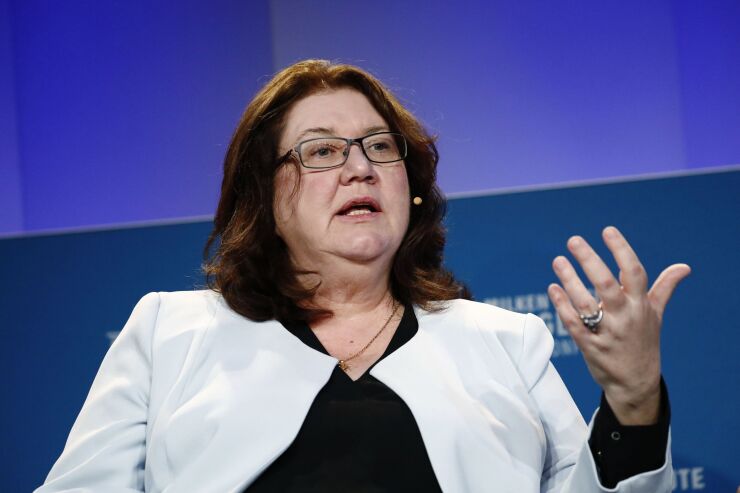As she looks to the future of the advice industry, Eileen Murray expects that the most successful firms will be staffed with more diverse, tech-savvy and socially conscious advisors.
The chairwoman of FINRA's board of directors offered a clear-eyed assessment of roadblocks the industry is facing and a mostly hopeful vision of how firms will navigate them in a conversation with FINRA CEO Robert Cook during the group's annual conference, held virtually this year.

Murray, the former co-CEO of Bridgewater Associates, is particularly passionate about advancing diversity and inclusion in the financial services sector. She recalled that when she was starting out in the field, women held just half of 1% of the leadership positions. One recent
"I don't know whether to cry or do the happy dance, because it's certainly not enough progress, and there are other forms of diversity we need to continue to make progress on," Murray said.
"Fifty percent of people we hire are women, and yet when you go up the ranks that dwindles dramatically, and I think part of that has to do with inclusion — how do you make people from diverse backgrounds feel included in the environment and bring their authentic selves to work?"
Murray said that although firm leaders often talk about the importance of a more diverse workforce, and many of their initiatives to that end are well intended, it's also too easy to pay lip service to hiring and promoting more women and minorities when there isn't any accountability associated with those efforts.
The solution? "I think the real key is holding CEOs' compensation — basically make sure that diversity and inclusion strategies and goals are part of a CEOs' compensation, part of senior management's compensation," she said. "And I'd like to see more reporting and standardization around diversity and inclusion because I think if it's measured it will be managed, and if it's not measured, I don't think people focus on it because they have so many other things to do."
-
A barred broker’s alleged version of the “infinite banking” strategy recommended that clients liquidate their 401(k)s or IRAs to buy variable annuities.
May 13 -
Constantinos Maniatis exercised discretion in seven customer accounts despite the firm no longer allowing discretionary trading, the regulator said.
April 29 -
One former rep is responsible for more than 80% of the firm’s sales of the defunct LJM Preservation & Growth Fund.
April 1
Murray would also like to see a more harmonized standard in how companies approach ESG, an area of surging interest among clients who want to align their investments with their values.
She welcomes the promotion of environmental and social responsibility, along with just corporate governance, but at present she sees a "patchwork of reporting frameworks around the globe" that make it impossible to objectively measure and compare how companies are living up to their ESG commitments.
"Who could argue with ESG — happier employees, a better environment all sound great, but there's a lot of work to realize the benefits of that," Murray said.
"The reporting of it is complicated, it's burdensome, it really isn't compatible across many companies," she added. "I believe ESG reporting should really mirror the norms and practices of financial reporting, including how it's regulated."
Murray said she spends a lot of time thinking about the future of the workplace. She was an early advocate of flexible working arrangements, and has seen the disruption of more than a year of pandemic-induced shutdowns accelerate the adoption of policies she has long championed.
But with ever larger swaths of the population being vaccinated against COVID-19, Murray argues that now is the time for firms to rethink what their remote work policy will look like after the pandemic and to take a fresh look at how they are training their workforce.
She lauded the firms under FINRA's oversight for nimbly transitioning to all-remote work last March. Going forward, she sees hybrid home/work arrangements in which most employees will come into the office a few days a week.
Cook acknowledged that firms are still working through their post-COVID policies, which for brokers could present new challenges around management and supervision.
"This is a struggle, but it does seem like the emerging trend is to have this hybrid environment," Cook said. "Then the challenge becomes how do you manage that hybrid environment effectively when you have some people in the office and some people at home."
Murray also sees a double-edged sword in the ways technologies like machine learning and artificial intelligence are taking hold in the industry. While inspired by the potential to streamline and improve firm operations, she also sees trouble ahead for firms that don't invest in training to create a more tech-savvy workforce.
"I could go on and on about technology and the advances we're making in it, and that's very exciting and it creates a tremendous opportunity, but with most opportunities if one doesn't focus on the second- and third-order consequences, you can find yourself having some problems," Murray said, warning of the "pandemic that's coming of the unskilled worker."
She cited a McKinsey study that estimated that tens of millions of jobs could be eliminated by 2030 owing various forms of automation.
It's incumbent on firms, then, to focus on retraining and "re-skilling" their workforces to position them for the types of jobs that will endure after the next wave of automation. Moreover, Murray observed, studies have documented that it's several times more expensive to hire new employees than it is to retrain current ones.
"It's just the right thing to do," she said. "It's amazing how just doing the right thing has positive business impact."






